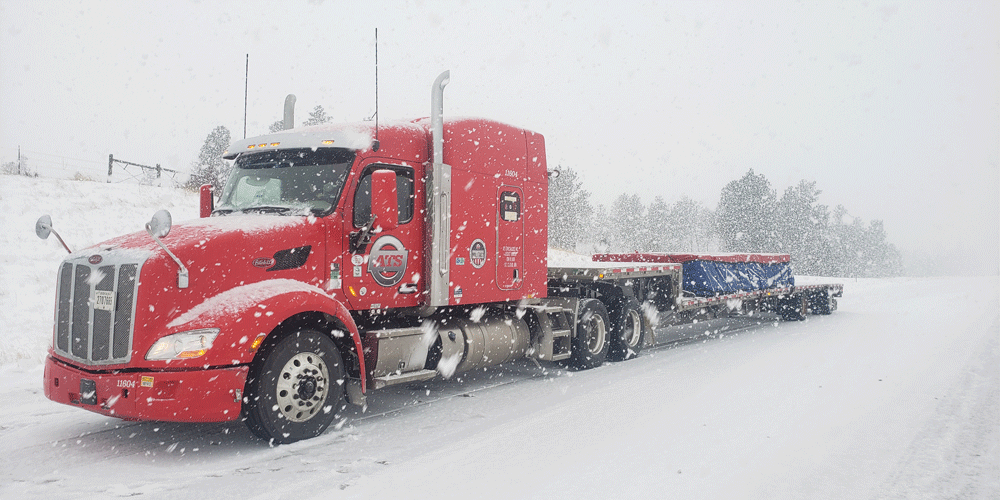
It’s hard to believe we’re in the final month of the year, but here we are!
December is upon us, and the freight market is (seemingly) emerging from the Great Freight Recession at long last.
In many ways, things are looking up in the trucking industry, but that doesn’t mean this month will be without its challenges.
Anderson Trucking Service (ATS) has been helping shippers navigate this industry for 70 years, and we’ve come to recognize December as a transitional time — one in which capacity may be hard to find across trailer types.
In this article, we’ll share what we know about shipping this time of year, both in terms of seasonal trends that reliably crop up annually and those that are unique to December 2024.
You’ll come away knowing more about what’s happening (and what to expect) in the trucking industry this month, including:
- Dry van capacity
- Reefer trailer capacity
- Open-deck capacity
- Over-dimensional (OD) freight
- How to plan for holiday shipping success
With this information, you’ll be ready to sleigh your shipping goals for the end of the year and set yourself up for a successful 2025.

How Will Dry Van Trailer Capacity Change in December?
This is traditionally the busiest shopping month of the year, with consumers buying gifts, home decor, and ingredients for festive feasts.
But because most of these items have already been delivered to stores well before retail peak season, dry van traffic is actually winding down.
In fact, dry vans are about to enter their slowest period, which traditionally occurs during the first quarter (January through March) of the new year.
Drivers will also be in shorter supply this month, as they’ll be taking advantage of the slow holiday season and enjoying extended home time with their loved ones.
That doesn’t mean dry van traffic will dry up completely for the next few months, though. Dry vans will still be moving spring-centric freight like gardening supplies, lawnmowers, and even spring break (read: warm weather!) apparel to stores.
Since the global pandemic of 2020, consumers have spent less on retail items, instead prioritizing services and experiences.
In 2024, inflation across spending categories and the high cost of goods overall put an additional damper on spending.
But these patterns may be on the upturn this month: The National Retail Federation reported in mid-November that 2024 holiday spending is predicted to reach a new record high.
This bodes well for the economic momentum heading into Q1 2025, which should help to keep those dry van trailers loaded and moving.
Related: Load-To-Truck Ratios: An Overview of How They Impact Your Freight Rates
How Will Reefer Trailer Capacity Change in December?
Refrigerated (reefer) trailers are used year-round to haul items like food and pharmaceuticals, but in the winter months, they’re also sought out to provide freeze protection for temperature-sensitive freight.
As such, reefer capacity will be tighter in December, specifically in and around the Midwestern and Northern states that experience the most intense winter weather and temperatures.
In the Pacific Northwest, reefers will be busy with the winter harvest of potatoes, apples, and winter squash. With so many trucks concentrated in this region, you’ll likely find lower rates in and around states like Washington and Oregon.
After the New Year holiday, expect those trucks to move south along the West Coast to take advantage of all the fruits and vegetables coming into the U.S. from Mexico.

How Will Open-Deck Capacity Change in December?
As it gets colder (and snowier) in many parts of the country, open-deck trailers like flatbeds and step-decks understandably fall out of favor.
In these regions, construction season is wrapped up until spring, which takes a significant portion of open-deck freight off the table. Tasks like tarping become more difficult and dangerous in winter weather, too.
These factors will make it harder to find an open-deck truck this December, especially in areas experiencing true winter.
Open-deck drivers will occasionally pivot to driving dry van trailers during this time, so they can continue working in the winter months. While this can be a great option for drivers, it unfortunately doesn’t make it easier for shippers to source a flatbed or open-deck solution.
That’s why it’s critical to plan ahead and schedule a truck if you’ll be shipping any unenclosed freight in December.
Your proactivity will likely afford you an additional benefit beyond secured capacity. The drivers who are continuing to haul open-deck freight in December will be eager for work, which may mean you’ll receive a better rate.
Shipping Over-Dimensional (OD) Freight in December
Like any other freight type, over-dimensional (OD) freight movements will undoubtedly be affected by winter weather.
The snow, ice, wind, and temperatures can be unpredictable this time of year and cause significant delays on short notice.
But OD freight is unique in its relationship to daylight hours, which are in short supply this month.
Most states restrict oversize freight travel to daylight hours, so expect over-dimensional hauls to take longer (and cost more) in December, the shortest month of the year.
Many states also restrict permitted freight travel on holidays, and state permit offices will be closed on state and federal holidays.
So don’t plan to move permitted loads on Christmas Day in the majority of states — and since the holiday is on a Wednesday this year, some states may have restrictions on Tuesday and/or Thursday, too.
Our advice? Give your drivers a well-deserved holiday break on those days. Your freight can move before or after Santa’s drop-in (and probably for less!)
The holiday restrictions aren’t done for the year after Christmas, though.
Don’t forget that New Year’s Eve and New Year’s Day are on the following Tuesday and Wednesday, respectively, and many states will have restrictions in place.
How to Plan for Shipping During the Holidays
Shipping on or around the holiday season takes proactive planning, communication, and coordination between shippers, carriers, and drivers.
Here are some of our tried-and-true tips for keeping your holiday shipping merry instead of scary:
Plan Ahead
The further ahead you can plan, the more likely you are to stay on your preferred timelines.
With driver shortages and increased demand happening all month long, it’s an especially good idea to book your trucks well in advance.
Contacting your transportation provider early can also help you get a better rate. If the carrier can use your shipment to help a driver meet another goal — like getting home for the holidays — you may be able to secure a discounted rate.
Communicate with Stakeholders
One of the worst mistakes shippers make is failing to communicate with everyone involved in a shipment. After all, there’s no use in scheduling a truck to arrive on December 23 if there’s no one available to unload it!
Before setting your shipping plans in stone, touch base with the shipper, receiver, and carrier during your planning process.
Confirm with all parties that on the date and time you’re aiming for, there will be:
- Inventory prepared for shipping
- Staff to load it onto the truck
- A truck and driver available to transport it
- Staff to load it off the truck
- Space to store the shipment once unloaded
These may seem like basics, but they’re worth reiterating. You’d be surprised how many shippers plan out a pick-up or delivery only to discover that the facility in question is closed that day!
If you can’t create a workable shipping plan for December, it might be best to reschedule the delivery for early in the new year. Delaying your shipment by a few weeks until everyone is prepared will have better results than forcing a delivery and accruing delays and additional fees.
Be Flexible
Whenever possible, be flexible with your shipping dates and times. Giving your carrier a window of a few days can make it much easier for them to find and schedule a truck and driver for your shipment.
There are also infinite variables that can impact a driver’s arrival, so if possible, allow your driver an arrival rather than a strictly scheduled time. (Think “between 8 a.m.-1 p.m.” rather than a 9 a.m. appointment.)
This gives your driver some much-appreciated wiggle room in their schedule, which can help them stay on track for your delivery as well as the rest of the day.
Taking these steps is an easy way to help ensure success in December. Once you’ve done your planning and prep, you get to step away and enjoy your seasonal festivities!
Get Ready for Successful December Shipments
The holiday season is stressful enough. You’re already juggling your in-laws, your kids, and last-minute gifts. The challenges of shipping your freight this month should be the last thing on your mind.
The good news? You now have the information and advice you need to plan ahead and make things easier for yourself this December.
By planning ahead, communicating with your shipping stakeholders, and choosing flexibility in your scheduling, you can ensure your December is full of festive cheer, not shipping fears.
Of course, Christmas isn’t the only holiday that impacts shipping. Learn more about how to ship freight around a holiday any time of year with these 3 Critical Planning Tips.
This article addresses the “hows” of holidays: How they impact the freight market, how to plan your shipping schedule around them most effectively, and how your freight carrier may be able to help.
Happy reading, and from the ATS family to yours, happy holidays!
